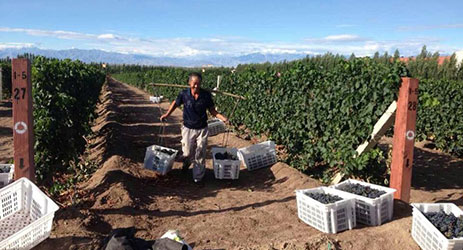Demei's View - Wine Communication from a Chinese Winemaker
At the end of 2012 the government launched an austerity campaign limiting officials’ spending on entertainment.
While most ordinary citizens are applauding the move, some business proprietors, especially luxury restaurant owners and fine wine retailers, are much less happy.
At the beginning, many people assumed that it was just another one of those temporary government campaigns and everything would be ‘back-to-normal’ soon. Some clubs and restaurants even asked their staff to take holidays and waited for the glorious days to come back.
Now two years have passed and it seems that the changed rules have become the norm.

Many fancy restaurants had to change their ways of running business, or simply shut their doors. Numerous wine retailers were busy getting rid of stocks and getting out of the business.
2014 seems to be an especially dark period for imported wines. During the first six months of 2014, the amount of imported bottled wines has shown a year-on-year decrease for the first time ever.
Even now many luxury restaurants and imported wine stores are still shivering in the freezing-cold winter, waiting for the sunshine to come back again.
A few days ago, I was invited by the Dadong Restaurant to taste their autumn menu. What I saw there was a completely different story; it made me think: even though all the restaurants are operating in the same market circumstances, how come some of them have gone out of business and had to close their doors, while the others are in good business, and even opening new chains?
Let’s talk about the history of Dadong Restaurant first.
Twenty years ago, if you talked about Dadong, it was possible that only Westerners would know about it.
‘Mr Da Dong (Dong is the restaurant proprietor’s surname. Mr Dong is 190cm’s tall—much taller than the usual Chinese population, hence the nickname Dadong, as Da means ‘big’. Many people know him as Da Dong and don’t even know his real name any more)’ is a chef by training. At the beginning, he was running a restaurant close to Tuanjiehu, Beijing.

One of the key sources of his business was international tourist groups. Though business started to pick up very soon, and the quality of the food there was known to many customers, Dadong restaurant wasn’t exactly one of the most influential restaurants in China.
Then there came the economy boom which also triggered the fast development of China’s food and drinks business.
Facing such a great opportunity, Dadong was looking for new ways to make his restaurant more well-known.
As one of the new-generation chefs of Shandong cuisine, Dadong perfected his two specialties; Roast Duck and Braised Sea Cucumber with Scallion. As a matter of fact, these two dishes made Dadong Restaurants even more famous than some of the other more prestigious restaurants in Beijing.
Also as an amateur photographer, Dadong carefully took photos of his dishes and printed them on the menu, so as to best present the charm of his dishes to consumers.
At the beginning of the new century Chinese consumers were changing their appetites while also shaping the way restaurants worked to attract customers. Some restaurants started to offer ‘home-style’ cuisine, while some turned into luxurious clubs.
Following this trend of change, Dadong also decided to redefine the identity of his business by opening a new restaurant in Nanxincang, Beijing in 2006.
The massive success of the new restaurant marked the success of Dadong Restaurants’ re-branding and guaranteed their top-class position in the food and drinks business not only in Beijing but across all of China.
There are of course many reasons behind the success of this specific restaurant in Nanxincang. Some may say that the Nanxincang area was planned to become a ‘street of Beijing speciality food’ by the local government thus naturally attract a massive number of customers. However, not every restaurant here managed to achieve success: in fact, there are quite a few that had to be shut down because they couldn’t make enough money.
Alongside the start of Dadong’s new restaurant, he launched the ‘Artistic Conception Food’ range. From ‘colour, aroma, taste, form’, every aspect of the range was carefully designed, and perfected, to match the atmosphere of the restaurant by his team. When dishes are served, the waiter or waitress will cite Ancient Chinese poems to describe the ‘artistic conception’ of the dish so as to bring spiritual enjoyment to consumers at the same time.
The 2008 Beijing Olympics not only brought waves of customers to Dadong restaurants but also made them more well-known and influential in Beijing.

© Dadong Restaurants
So far Dadong has opened 10 restaurants in Beijing and Shanghai. The daily gross turnover of all Dadong restaurants reaches over 3 million RMB with an average of 5000 dishes of Braised Sea Cucumber with Scallion and 5000 dishes of Roast Duck sold on a daily bases.
Now, it seems unconvincing to me that the austerity measures have killed off those ‘luxurious’ restaurants—hardly any of them could match the sales of Dadong even in their most glorious days.
If we compare Dadong restaurants with those similarly-priced-but-eventually-died-out restaurants it’s not difficult for us to tell the difference: customers of Dadong restaurants are mostly business people and foodies. It’s impossible to identify where exactly all these customers come from; the only reasons to visit restaurants are based on ‘reputation, quality and service’.
But for those washed-out restaurants, although they used to have a stable stream of ‘special clients’ they paid too much attention to those key customers and never managed to cultivate the small independent customer base. Naturally, their whole business was gone when those key customers disappeared.
As someone working in the wine industry, this immediately reminded me about a similar phenomenon in the wine market.
While many proprietors groan about a sluggish market in recent years there are actually quite a few wine shops who have managed to keep a steady growth of sales.
The wine store Ruby Red, which opened in Shanghai in 2006, is a great example. Though most say that 2013 wasn’t a year for the wine business, they managed to grow by 10% year-on-year. While many wine stores have been suffering from shrinking business, and having to shut down their chain stores, Ruby Red has just opened another store in Beijing this year.
The owner, Simon Zhou, told me that a focus on direct consumption has been the key to their success. As most of their clients buy and consume wines themselves, when choosing which wines to buy for the store, he always chooses quality wines with their own characteristics and sets a reasonable price. Throughout the years of operation he has never paid too much attention on developing big groups of buying clients.
I suppose no one at the moment assumes that the austerity measures will be lifted soon or indeed that they will ever be lifted. Under such market circumstances I suppose only those who follow the rhythm of the market and treat consumers seriously can stay in business.
In that case, why shouldn’t we professionals embrace the changes with an open heart?
Translated by Sylvia Wu / 吴嘉溦
All rights reserved by Future plc. No part of this publication may be reproduced, distributed or transmitted in any form or by any means without the prior written permission of Decanter.
Only Official Media Partners (see About us) of DecanterChina.com may republish part of the content from the site without prior permission under strict Terms & Conditions. Contact china@decanter.com to learn about how to become an Official Media Partner of DecanterChina.com.






Comments
Submit